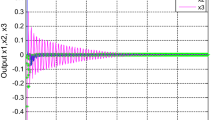Abstract
This paper studies the stability issue of recurrent neural networks (RNNs) with time-varying delay. Firstly, an extended delay-dependent integral inequality that contains more free matrices is presented, which is an extension of some existing delay-dependent integral inequalities. Secondly, by employing the extended delay-dependent integral inequality, a tight upper bound of the Lyapunov-Krasovskii functional (LKF) derivative is estimated, then a new criterion on stability analysis of delayed RNNs is obtained. Finally, simulation results are provided to verify the superiority of the presented method.

Similar content being viewed by others
References
Fujita S, Nishimura H (1995) Evolving neural networks with iterative learning scheme for associative memory. Neural Process Lett 2:1–5
Marcone G, Martinelli G, Lancetti L (1998) Eye tracking in image sequences by competitive neural networks. Neural Process Lett 7:133–138
Li C, Wu S, Feng G, Liao X (2011) Stabilizing effects of impulses in discrete-time delayed neural networks. IEEE Trans Neural Netw 22(2):323–329
Yang G, Ding F (2020) Associative memory optimized method on deep neural networks for image classification. Inf Sci 533:108–119
Tan G, Wang Z, Li C (2020) \(H_{\infty }\) performance state estimation of delayed static neural networks based on an improved proportional-integral estimator. Appl Math Comput 370:124908
Zhang J, Dai J, Zhang H, Sun S (2021) Cooperative output regulation of heterogeneous linear multi-agent systems based on the event-triggered distributed control under switching topologies. Appl Math Comput 390:125611
Wang Y, Wang Z (2021) Data-driven model-free adaptive fault-tolerant control for a class of discrete-time systems. IEEE Trans Circuits Syst II: Express Briefs. https://doi.org/10.1109/TCSII.2021.3076890
Ding S, Wang Z, Xie X (2021) Periodic event-triggered synchronization for discrete-time complex dynamical networks. IEEE Trans Neural Netw Learn Syst. https://doi.org/10.1109/TNNLS.2021.3053652
Ahn CK, Shi P, Wu L (2015) Receding horizon stabilization and disturbance attenuation for neural networks with time-varying delay. IEEE Trans Cybern 45(12):2680–2692
Zhang H, Wang Z, Liu D (2014) A comprehensive review of stability analysis of continuous-time recurrent neural networks. IEEE Trans Neural Netw Learn Syst 25(7):1229–1262
Tian Y, Wang Z (2021) A switched fuzzy filter approach to \(H_{\infty }\) filtering for Takagi-Sugeno fuzzy Markov jump systems with time delay: The continuous-time case. Inf Sci 557:236–249
Liu D, Ye D (2021) Edge-based decentralized adaptive pinning synchronization of complex networks under link attacks. IEEE Trans Neural Netw Learn Syst. https://doi.org/10.1109/TNNLS.2021.3061137
Tan G, Wang Z (2021) Generalized dissipativity state estimation of delayed static neural networks based on a proportional-integral estimator with exponential gain term. IEEE Trans Circuits Syst II: Exp Briefs 68:356–360
Tan G, Wang Z (2020) Reachable set estimation of delayed Markovian jump neural networks based on an improved reciprocally convex inequality. IEEE Trans Neural Netw Learn Syst. https://doi.org/10.1109/TNNLS.2020.3045599
Lin D, Chen X, Yu G, Li Z, Xia Y (2021) Global exponential synchronization via nonlinear feedback control for delayed inertial memristor-based quaternion-valued neural networks with impulses. Appl Math Comput 401:126093
Ding S, Wang Z, Rong N (2021) Intermittent control for quasisynchronization of delayed discrete-time neural networks. IEEE Trans Cybern 51(2):862–873
Gu K, Kharitonov VL, Chen J (2003) Stability of time-delay systems. Birkhäuser, Cambridge, MA, USA
Wang Z, Liu L, Shan Q, Zhang H (2015) Stability criteria for recurrent neural networks with time-varying delay based on secondary delay partitioning method. IEEE Trans Neural Netw Learn Syst 26(10):2589–2595
Zhang C, He Y, Jiang L, Wu M (2016) Stability analysis for delayed neural networks considering both conservativeness and complexity. IEEE Trans Neural Netw Learn Syst 27(7):1486–1501
Tian Y, Wang Z (2021) Composite slack-matrix-based integral inequality and its application to stability analysis of time-delay systems. Appl Math Lett. https://doi.org/10.1016/j.aml.2021.107252
Li H, Li C, Ouyuan D, Nguang SK (2021) Impulsive synchronization of unbounded delayed inertial neural networks with actuator saturation and sampled-data control and its application to image encryption. IEEE Trans Neural Netw Learn Syst 32(4):1460–1473
Huang H, Huang T, Chen X (2013) Guaranteed \(H_{\infty }\) performance state estimation of delayed static neural networks. IEEE Trans Circuits Syst II, Exp Briefs 60(6):371–375
Huang H, Huang T, Chen X (2015) Further result on guaranteed \(H_{\infty }\) performance state estimation of delayed static neural networks. IEEE Trans Neural Netw Learn Syst 26(6):1335–1341
Xiong J, Zhang G (2018) Improved stability criterion for recurrent neural networks with time-varying delays. IEEE Trans Neural Netw Learn Syst 29(11):5756–5760
Skelton RE, Iwasaki T, Grigoradis KM (1997) A unified algebraic approach to linear control design. Taylor and Francis, New York, USA
Tian Y, Wang Z (2020) Extended dissipativity analysis for Markovian jump neural networks via double integral-based delay-product-type Lyapunov functional. IEEE Trans Neural Netw Learn Syst. https://doi.org/10.1109/TNNLS.2020.3008691
Zhang C, He Y, Jiang L, Wang Q, Wu M (2017) Stability analysis of discrete-time neural networks with time-varying delay via an extended reciprocally convex matrix inequality. IEEE Trans Cybern 47(10):3040–3049
Zhang C, He Y, Jiang L, Lin W, Wu M (2017) Delay-dependent stability analysis of neural networks with time-varying delay: A generalized free-weighting-matrix approach. Appl Math Comput 294:102–120
Lin W, He Y, Zhang C, Wu M (2018) Stability analysis of neural networks with time-varying delay: Enhanced stability criteria and conservatism comparisons. Commun Nonlinear Sci Numer Simul 54:118–135
Acknowledgements
This work was supported in part by the National Natural Science Foundation of China (grant no. 61973070), the Liaoning Revitalization Talents Program (grant no. XLYC1802010), and in part by SAPI Fundamental Research Funds (grant no. 2018ZCX22).
Author information
Authors and Affiliations
Corresponding author
Additional information
Publisher's Note
Springer Nature remains neutral with regard to jurisdictional claims in published maps and institutional affiliations.
Rights and permissions
About this article
Cite this article
Tan, G., Wang, Z. A New Result on Stability Analysis of Recurrent Neural Networks with Time-Varying Delay Based on an Extended Delay-Dependent Integral Inequality. Neural Process Lett 53, 4365–4375 (2021). https://doi.org/10.1007/s11063-021-10601-y
Accepted:
Published:
Issue Date:
DOI: https://doi.org/10.1007/s11063-021-10601-y



